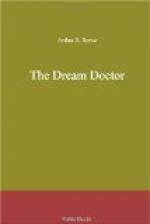We spent several enjoyable hours about the town, picking up a good deal of miscellaneous and useless information. It was, however, as Kennedy had suspected. Annie Grayson had taken up her residence in an artistic little house on one of the best side streets of the town. But her name was no longer Annie Grayson. She was Mrs. Maud Emery, a dashing young widow of some means, living in a very quiet but altogether comfortable style, cutting quite a figure in the exclusive suburban community, a leading member of the church circle, an officer of the Civic League, prominent in the women’s club, and popular with those to whom the established order of things was so perfect that the only new bulwark of their rights was an anti-suffrage society. In fact, every one was talking of the valuable social acquisition in the person of this attractive young woman who entertained lavishly and was bracing up an otherwise drooping season. No one knew much about her, but then, that was not necessary. It was enough to accept one whose opinions and actions were not subversive of the social order in any way.
The Willoughbys, of course, were among the most prominent people in the town. William Willoughby was head of the firm of Willoughby & Walton, and it was the general opinion that Mrs. Willoughby was the head of the firm of Ella & William Willoughby. The Willoughbys were good mixers, and were spoken well of even by the set who occupied the social stratum just one degree below that in which they themselves moved. In fact, when Mrs. Willoughby had been severely injured in an automobile accident during the previous summer Glenclair had shown real solicitude for her and had forgotten a good deal of its artificiality in genuine human interest.
Kennedy was impatiently waiting for an opportunity to recover the box which he had left under the Willoughby porch. Several times we walked past the house, but it was not until nightfall that he considered it wise to make the recovery. Again we slipped silently up the terraces. It was the work of only a moment to cut the wires, and in triumph Craig bore off the precious oak box and its batteries.
He said little on our journey back to the city, but the moment we had reached the laboratory he set the box on a table with an attachment which seemed to be controlled by pedals operated by the feet.
“Walter,” he explained, holding what looked like an earpiece in his hand, “this is another of those new little instruments that scientific detectives to-day are using. A poet might write a clever little verse en-titled, ’The telegraphone’ll get you, if you don’t watch out.’ This is the latest improved telegraphone, a little electromagnetic wizard in a box, which we detectives are now using to take down and ‘can’ telephone conversations and other records. It is based on an entirely new principle in every way different from the phonograph. It was discovered by an inventor several years ago, while experimenting in telephony.




